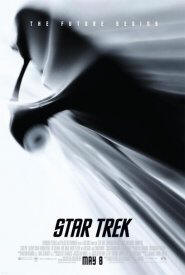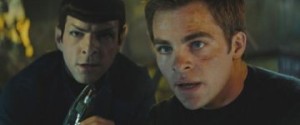 This is not your father’s Star Trek.
This is not your father’s Star Trek.
Early in J. J. Abrams reboot of the Star Trek franchise, a young James Kirk recklessly drives a vintage 1966 Corvette convertible right off a cliff, only leaping out to safety at the last moment, while the car plummets hundreds of feet to presumably smash against the rocky bottom. 1966. That’s the same year the original William Shatner/Leonard Nimoy-starring television series Star Trek debuted. This is Abrams’ none too subtle statement that you will need to push aside any preconceived notions you may have about the four decades old franchise in favor of his new iteration.
Rebooting or reinvigorating a franchise can be a difficult prospect. It is something that the producers of the James Bond franchise have had to face every fifteen or so years. Abrams almost faced the task once before when he was briefly attached to the Superman project that eventually became director Bryan Singer’s Superman Returns. Here though, Abrams manages to the most delicate of balancing acts- finding a way to tell a new version of the voyages of Captain Kirk and the crew of the starship Enterprise without alienating old fans and being welcoming to those new to the franchise. And surprisingly, he uses one the series’ hoariest of clichés, time travel, to do it.
Renegade Romulan Nero (Eric Bana, making the best of an under-written role) has inadvertently travelled back in time following the destruction of his home world, and the death of his wife and unborn child. Blaming the Vulcans for the tragedy, he sets out to destroy their world a century before his meets its demise, uncaring that his actions are rewriting what should be history for him. Standing in his way are the brash Starfleet Academy cadets manning the Starfleet’s newly commissioned flagship, the USS Enterprise, including the brash James Kirk (Chris Pine), his friend Dr. Leonard “Bones” McCoy (Karl Urban) and the half-human, Half-Vulcan Spock (Zachary Quinto).
More so here than in other franchise relaunchings, I think the key question is “Is Star Trek a classic because of its actors or because of its characters?” There’s no denying that Shatner has had considerable non-Trek success in television, but when it comes time to write his obituary, the name James Kirk will be mentioned well before either T. J. Hooker or Denny Crane. Most of the rest of the cast weren’t as lucky to escape from the dreaded prison of stereotyping. Cast member James Doohan would often state that members of the public would be surprised when they met him that he didn’t have the Scottish accent of his character, Chief Engineer Montgomery Scott.
And while the original series actors will forever be intertwined with their roles, the group of actors who Abrams has assembled does their best to bring forth what fans expect from each character without resorting to flat out mimicry of the original cast. Pine’s Captain Kirk is all swagger, an adrenaline junkie who lives for putting himself into dangerous situations. It is only through the counsel of his father’s old friend, Captain Christopher Pike, that Kirk manages to channel this into something positive. Urban seems to relish Dr. “Bones” McCoy’s several trademark lines while Simon Pegg as Engineer Scott just seems overjoyed to be in a Star Trek movie. It should be interesting to see what long time fans make of some of the new deviations that Abrams has added into the mix of characters. I foresee some spirited debate over a certain romantic relationship between two characters that Abrams has created.
 Although Abrams and company are essentially creating their own, new Star Trek universe, they are careful to make sure there are plenty of nods to the original to keep fans happy. It is still extremely hazardous to one’s health to wear a red shirt in the vicinity of Captain Kirk. Classic catch phrases are sprinkled throughout the script, though as the film races towards its finale, their frequency increases as if the script writers suddenly realized that they were running out of time to use them.
Although Abrams and company are essentially creating their own, new Star Trek universe, they are careful to make sure there are plenty of nods to the original to keep fans happy. It is still extremely hazardous to one’s health to wear a red shirt in the vicinity of Captain Kirk. Classic catch phrases are sprinkled throughout the script, though as the film races towards its finale, their frequency increases as if the script writers suddenly realized that they were running out of time to use them.
While Star Trek has much going for it, it still has a few points where it falls short of the mark. As written, Nero is pretty much another in a long line of interchangeable Trek villains. The only difference is that he is slightly more effective in implementing his nefarious plans than many of the others. The problem is that ultimately, Nero is a plot device whose existence is solely dictated by the creative need to create this new film’s alternate timeline. As such, he has no real connection with the crew of the Enterprise. Kirk and company just happen to be the ones there to stop his scheme. A touch of comic relief involving some side-effects to a space flu shot McCoy administers to Kirk falls flat and carries on far too long.
Abrams biggest departure from classic Star Trek, though, is in the type of story he is telling. When the series first premiered, creator Gene Roddenberry envisioned the show as a way to tell stories that commented on current politics and the human condition. Yes, sometimes it was heavy-handed (Yangs and Comms, anyone?) but at least it made the series about something. However, as the franchise grew, it lost that layer of subtext, instead crawling inside a cocoon spun of its own continuity and technobabble. Star Trek became about very little else other than Star Trek. It is unfortunate that with a return to its roots, as it were, that Abrams couldn’t see fit to add some deeper layers to his story.
But there was also the element that the crew of the Enterprise were explorers, out on the fringes of known territory, much like sailing vessels in the 1600 and 1700s. Abrams definitely captures that high adventure aspect of the original series. The action moves at a brisk pace and the stakes are as grand as it gets in a Trek film with the fate of entire planets hanging in the balance. Abrams and script writers Roberto Orci and Alex Kurtzman take some interesting and what are sure to be controversial risks and they pay off.
Star Trek may not quite be as successful a franchise reinvention as was the 2007 James Bond film Casino Royale. It is a film that serves the business need to wipe the slate clean, while setting up the new direction that the franchise will be taking. As such, it is something of a cinematic sorbet, cleansing our pallet. I can’t wait to see how tasty the next course is.




I just had hoped for a better actor playing Chekov. He was unspeakably bad!